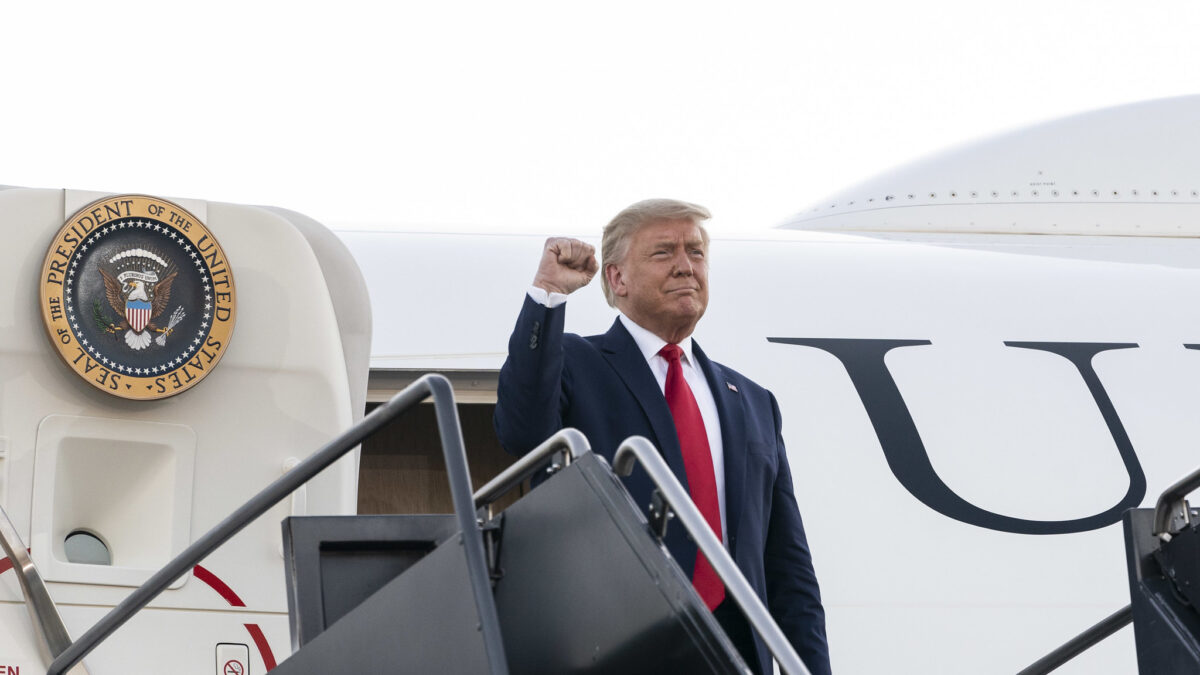Judge Aileen Cannon unsealed a trove of documents Monday that appear to reveal a coordinated effort within the Biden administration to target Donald Trump with political prosecution after he left office.
Special Counsel Jack Smith and other federal prosecutors in President Biden’s Department of Justice (DOJ) indicted Trump in June 2023 for allegedly mishandling classified documents at his Mar-a-Lago home. The indictment followed an unprecedented raid on a former president’s home the prior summer.
President Biden also retained classified documents after leaving the vice presidency. Yet he was not charged because prosecutors say they believed he would “present himself to the jury, as he did during our interview with him, as a sympathetic, well-meaning, elderly man with a poor memory.”
Here are the three most shocking revelations in the lawfare case against Trump thanks to the newly unsealed documents, in part as pointed out by independent reporter Julie Kelly on X.
1. DOJ Allegedly Threatened Lawyer’s Judicial Nomination
Jay Bratt, the special counsel’s lead prosecutor, allegedly threatened Trump staff member Walt Nauta’s attorney, Stanley Woodward, with sabotaging his judicial nomination to the Superior Court of the District of Columbia if he could not get Nauta to turn on Trump, according to a newly unsealed motion originally filed in June 2023. Nauta served in Trump’s White House and remained a personal aide to the president after he left office.
The motion requested D.C. District Chief Judge James Boasberg order the “disclosure of certain grand jury materials identified by counsel as likely to reflect misconduct by the government before the grand jury.”
During Woodward and Bratt’s first meeting, which took place two weeks after Mar-a-Lago was raided on August 24, 2022, Woodward “was led to a conference room where Mr. Bratt awaited with what appeared to be a folder containing information about Mr. Woodward,” according to the motion.
“Mr. Bratt thereupon told Mr. Woodward he didn’t consider him to be a ‘Trump lawyer,’ and he further said that he was aware that Mr. Woodward had been recommended to President Biden for an appointment to the Superior Court of the District of Columbia,” the motion continues. “Mr. Bratt followed up with words to the effect of ‘I wouldn’t want you to do anything to mess that up.’ Thereafter, Mr. Bratt advised Mr. Woodward that ‘one way or the other’ his client, Walt Nauta, would be giving up his lavish lifestyle of ‘private planes and golf clubs’ and he encouraged Mr. Woodward to persuade Mr. Nauta to cooperate with the government’s investigation (this was prior to the appointment of the Special Counsel).”
The motion argues Bratt’s “statement suggested a quid pro quo or even a threat intended to cause Mr. Woodward to persuade his client to cooperate with Mr. Bratt…Under such circumstances, it is appropriate for the Court to ease the secrecy protections typically afforded by Rule 6(e) so that it may determine if similar egregious behavior has made its way into this unprecedented investigation, particularly regarding the testimony of Mr. Nauta.”
The DOJ described the incident as follows: “Bratt also informed Woodward that the Government was interested in obtaining Nauta’s potential cooperation and resolving his situation.”
“At no point during the meeting did Woodward suggest that any of the prosecutors’ comments were improper,” the DOJ argued.
Woodward and his partner stated in a letter to Boasberg that their “representation of Mr. Nauta was not adversely impacted” by the alleged discussion and that they had not “complained about the statements in the August 24 meeting” but were bringing it to light after learning “the conduct exhibited in the August 24 meeting may not have been isolated.”
Smith also said the allegations were referred to the DOJ’s Office of Professional Responsibility at Bratt’s request before lamenting that the defense dared to accuse a government official of threatening a private citizen’s lawyer. Smith said it was “wholly without merit” for the defense to allege that Bratt — whom Smith noted had three decades worth of experience — would threaten Woodward with retaliation.
2. White House Allegedly Involved From The Start
Following Trump’s departure from office, the National Archives and Records Administration (NARA) began “to work with the White House Office of Records Management on exaggerated claims related to records handling under the Presidential Records Act (PRA),” a motion to compel discovery from Trump’s attorney’s states.
NARA General Counsel Gary Stern sent a letter to Trump’s PRA “representatives” in May of 2021 in which he said he “had several conversations” with the White House’s Office of Records Management and had raised some “concerns,” presumably about the documents in question, with NARA Archivist David Ferriero, according to pictures of the new, less-redacted filing posted by Kelly.
Stern’s letter noted that “things were very chaotic, as they always are in the course of a one-term transition” and acknowledged transferring the documents would take “several more months,” according to the filing. Ferriero, however, said in June 2021 he was “out of patience,” dismissing “good-faith efforts by President Trump’s PRA representatives to address issues raised by NARA,” according to the filing.
The filing alleges Ferriero then “threatened” one of Trump’s PRA representatives in August that he was presuming that 24 “alleged — and non-existent” boxes of records were “destroyed” and that Ferriero would report his claims of missing documents to the White House and Department of Justice.
By September, Stern was sending around a letter “that we could consider sending to the Attorney General about missing Trump records,” according to the filing. Stern also sent an email admitting he “informally reached out to the DOJ counsel about this issue” and that “WH counsel is now also aware of the issue, and has asked that I keep them in the loop to the extent that we make any reference to [WH-ORM],” according to the filing.
The filing alleges that Deputy White House Counsel Jonathan Su asked one of Trump’s PRA representatives to permit an undisclosed individual to access “notes from the Trump administration relating to records handling.” The filing alleges that Su did not disclose that NARA “had already drafted a referral letter and contacted DOJ.”
3. Trump’s Security Clearance Allegedly Retroactively Revoked
Biden’s Department of Energy also allegedly revoked Trump’s security clearance after Smith indicted Trump in June 2023, according to a 2024 motion to compel discovery from Trump’s lawyers posted on X by Kelly.
The Energy Department’s “Central Personnel Clearance Index and Clearance Action Tracking System ‘reflect[ed] an active Q clearance’ for President Trump,” the unredacted motion states, according to Kelly’s post.
The DOE’s assistant general counsel then “instructed that the relevant systems ‘be immediately amended’ and ‘promptly modified to reflect the terminated status of [President] Trump’s Q clearance,'” the filing states.
Trump “requested additional disclosures relating to the Energy Department’s determination and other security clearance issues” but the office allegedly “declined to provide any additional information.”
Judicial Watch announced Monday it filed a Freedom of Information Act lawsuit against the Department of Energy for records relating to the alleged termination of Trump’s security clearance.







